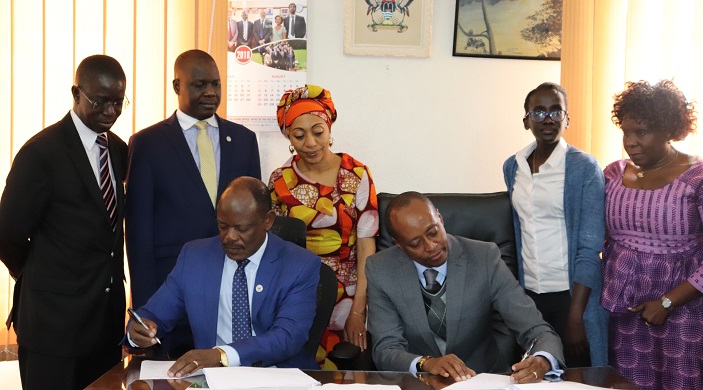On 1st August 2018, Makerere University Signed a Memorandum of Understanding (MoU) with the Africa Strategic Leadership Centre (ASLC), in which the two parties agreed to use research-based policies to enhance Africa’s social and economic Development. Signed by the Vice Chancellor of Makerere University, Prof. Barnabas Nawangwe and the Chairman, Board of Africa Strategic Leadership Centre, Dr. Robert Mwesigwa Rukaari on behalf of the two institutions respectively, the MoU stipulated that the two parties will:
- Explore opportunities for collaboration in fostering relationships between political actors, civil societies, academia and private sectors in understanding the binding constraints to Africa’s development and identifying opportunities for Africa’s transformation.
- Foster peace and security on the continent through offering pro-active solutions to the cause of conflict in Africa
- Harmonize national, regional and continental interest and highlight a positive and balanced perspective on Africa
- Contribute and influence policy using independent evidence based research
The Africa Strategic Leadership Center (The Centre) is a collaborative initiative of leaders from public and private sectors, committed to Africa’s progress, cultivating growth opportunities and investing in the continent’s human capital. The Center engages key leaders from governments, business and industry, civil society, academia and other socio-economic influencers and opinion leaders to drive Africa’s next transformation agenda.

The Africa Strategic Leadership Centre was officially launched on Tuesday, July 31st 2018 by the Prime Minister of the Republic of Uganda Rt. Hon. Ruhakana Rugunda at Sheraton Hotel, Kamapala. The High Profile launch that focused on understanding the pivotal role of think-tanks towards Africa’s growth was attended by prominent persons among which; was Mrs. Samia Yaba Nkrumah, the daughter of the legendary Dr. Kwame Nkrumah.
“Our focus is to achieve a shared agenda, followed with complementary actions for building social order, political stability and inclusive economic growth across the African continent. We are equally committed to achieving actions representing a realistic image of Africa and supporting African countries in developing critically needed leadership and systems for catalyzing development,” said Awel Uwihanganye, the Associate Director and Secretary to the Board, Africa Strategic Leadership Centre.
The signing of the MoU at Makerere University, was graced by Samia Yaba Nkrumah and was witnessed by; Betty Bigombe, the Senior Director for Fragility, Conflict, and Violence at the World Bank; Rt. Hon. Daniel Kidega, Speaker of the 3rd East African Legislative Assembly (EALA); Irene Ikomu,member of Parliamentary Watch Uganda; Mr. Henry Mwebe, the Director Legal Affairs, Makerere University; Prof. Edward Kirumira, thePrincipal, College of Humanities and Social Sciences; Dr. Nansozi K. Muwanga, Former Head, Department of Political Science and Public Administration; Dr Andrew Elias State, Dean, School of Social Sciences; and Dr. Paul Omach, Head, Department of Political Science and Public Administration.

Commenting on the partnership, the Vice Chancellor, Prof. Barnabas Nawangwe said that Makerere University is ready to engage in research and develop policies that will inform several changes and developments in Africa. He applauded the Africa Strategic Leadership Centre (ASLC) for the commitment to pool resources with the aim of identifying leadership and institutional ingredients necessary to address Africa’s growth bottlenecks.
In a special way, Prof. Barnabas Nawangwe welcomed Ms. Samia Yaba Nkrumah to Makerere University, the incubation Centre of African leaders.
“At Makerere University, we are committed to ensuring that this partnership succeeds. We have the best human resource; this means that the potential is huge. Many of our staffs have engaged in research to find solutions to Africa’s problems and we are therefore up to the task,” he said.
The Chairman to the Board of Africa Strategic Leadership Centre, Dr. Robert Mwesigwa Rukaari, commended Makerere University for the various initiatives that the institution has put in place to find home-grown solutions to Africa’s challenges. “You have made extensive research and found solutions on aspects such as transformational leadership, ICT, peace and security, climate change and environmental conservation, food security and agriculture, economy, trade and investment, leadership and governance. We greatly appreciate your efforts,” he said.

Samia Nkrumah thanked Makerere University for the warm welcome and applauded the institution for upholding Africa’s legacy through research, innovations, leadership training and mentorship, and the immense investment in production of human capital.
“I am happy to visit Makerere University, a renowned leadership academy that has groomed many African leaders. Your research has informed the world on the greatness of Africa as a continent,” she remarked.
The delegation led by Samia Yaba Nkrumah also visited the Nkrumah Hall, at Makerere University.
Africa Strategic Leadership Centre is soon organizing, the “Africa Now” conference. The conference will be an annual signature leadership event bringing together leading African minds to consider key constraints to socio-economic growth, an act of achieving drivers to secure a better future for Africa.
Article by: Mak Public Relations Office.

 Humanities & Social Sciences6 days ago
Humanities & Social Sciences6 days ago
 General5 days ago
General5 days ago
 Health2 weeks ago
Health2 weeks ago
 Agriculture & Environment1 week ago
Agriculture & Environment1 week ago
 General2 weeks ago
General2 weeks ago







